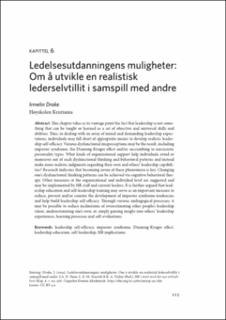| dc.contributor.author | Drake, Irmelin | |
| dc.date.accessioned | 2023-11-30T12:42:53Z | |
| dc.date.available | 2023-11-30T12:42:53Z | |
| dc.date.created | 2023-11-28T09:32:18Z | |
| dc.date.issued | 2023 | |
| dc.identifier.citation | HR i møte med det nye arbeidslivet. Cappelen Damm Akademisk. | en_US |
| dc.identifier.isbn | 9788202812249 | |
| dc.identifier.uri | https://hdl.handle.net/11250/3105427 | |
| dc.description.abstract | This chapter takes as its vantage point the fact that leadership is not something that can be taught or learned as a set of objective and universal skills and abilities. Thus, in dealing with an array of mixed and demanding leadership expectations, individuals may fall short of appropriate means to develop realistic leadership self-efficacy. Various dysfunctional misperceptions may be the result, including imposter syndrome, the Dunning-Kruger effect and/or succumbing to narcissistic personality types. What kinds of organizational support help individuals avoid or maneuver out of such dysfunctional thinking and behavioral patterns and instead make more realistic judgments regarding their own and others’ leadership capabilities? Research indicates that becoming aware of these phenomena is key. Changing one’s dysfunctional thinking patterns can be achieved via cognitive behavioral therapy. Other measures at the organizational and individual level are suggested and may be implemented by HR staff and current leaders. It is further argued that leadership education and self-leadership training may serve as an important measure to reduce, prevent and/or counter the development of imposter syndrome tendencies and help build leadership self-efficacy. Through various andragogical processes, it may be possible to reduce inclinations of overestimating other people’s leadership talent, underestimating one’s own, or simply gaining insight into others’ leadership experiences, learning processes and self-evaluations. | en_US |
| dc.language.iso | nob | en_US |
| dc.publisher | Cappelen Damm Akademisk | en_US |
| dc.rights | Navngivelse 4.0 Internasjonal | * |
| dc.rights.uri | http://creativecommons.org/licenses/by/4.0/deed.no | * |
| dc.subject | Lederskap | en_US |
| dc.subject | Mestringstro | en_US |
| dc.subject | Self-efficacy | en_US |
| dc.subject | Imposter syndrome | en_US |
| dc.subject | Bedragersyndrom | en_US |
| dc.subject | Dunning-Kruger effekten | en_US |
| dc.subject | Lederutvikling | en_US |
| dc.subject | Selvledelse | en_US |
| dc.subject | HR | en_US |
| dc.subject | Human resources | en_US |
| dc.title | Ledelsesutdanningens muligheter: Om å utvikle en realistisk lederselvtillit i samspill med andre | en_US |
| dc.title.alternative | Ledelsesutdanningens muligheter: Om å utvikle en realistisk lederselvtillit i samspill med andre | en_US |
| dc.type | Book | en_US |
| dc.description.version | publishedVersion | en_US |
| dc.source.pagenumber | 115-138 | en_US |
| dc.identifier.doi | https://doi.org/10.23865/noasp.192.ch6 | |
| dc.identifier.cristin | 2203448 | |
| cristin.ispublished | true | |
| cristin.fulltext | original | |
| cristin.qualitycode | 1 | |

